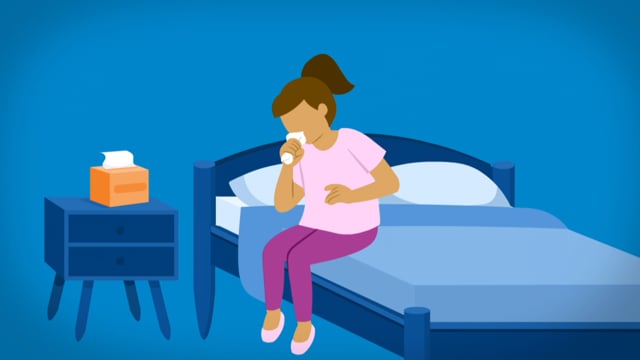Diarrhea
What Is Diarrhea?
Diarrhea is frequent soft or loose bowel movements (poop). Most kids have diarrhea from time to time. It usually doesn't last long and often gets better on its own.
What Causes Diarrhea?
Diarrhea (dye-uh-REE-uh) is usually caused by an infection in the intestines, called gastroenteritis (gastro-en-ter-EYE-tiss).
Gastroenteritis can cause crampy belly pain, followed by diarrhea that lasts about 3–5 days. Other symptoms may include:
- fever
- loss of appetite
- nausea (an uncomfortable feeling before vomiting)
- vomiting
- weight loss
- dehydration
Children with diarrhea lasting longer than a couple of weeks may have other symptoms, depending on the cause.
The germs that cause gastroenteritis are:
- viruses (most common)
- bacteria
- parasites
Viruses
Viral gastroenteritis (or "stomach flu") is a top cause of diarrhea in kids. It also can bring on nausea, vomiting, and belly pain. Symptoms usually last a few days, and kids can get dehydrated if they don’t drink enough liquids while they’re sick.
Rotavirus is a common cause of watery diarrhea in infants and young children. Outbreaks are more common in the winter and early spring, especially in childcare centers. The rotavirus vaccine can protect children from this illness.
Norovirus is another common virus that causes watery diarrhea along with the other symptoms of gastroenteritis. Often, it’s spread through contaminated food and water.
Bacteria
Many different types of bacteria can cause diarrhea, including E. coli, Salmonella, Campylobacter, and Shigella. These bacteria are often responsible for food poisoning, which can cause diarrhea and vomiting within a few hours of eating contaminated food.
Parasites
Giardia is the most common parasitic infection that causes diarrhea in kids. Young children are more likely to get giardia, especially in childcare centers.
What Else Can Cause Diarrhea?
Kids can sometimes get diarrhea from:
- drinking too much juice and other sugar-sweetened beverages (sometimes called “toddler’s diarrhea”)
- food allergies
- lactose intolerance
- antibiotics
- medical problems like celiac disease and inflammatory bowel disease (Crohn's disease and ulcerative colitis), and irritable bowel syndrome
How Do Doctors Find the Cause of Diarrhea?
Doctors will:
- ask about what the child ate most recently, when symptoms began, and how often and how long the diarrhea is happening
- ask specific questions about the diarrhea: Is it watery? Is there blood in the poop?
- do an exam
- order a stool test, urine test, or blood test to check for dehydration and to see what’s causing the diarrhea, if needed
How Is Diarrhea Treated?
Diarrhea from viral gastroenteritis goes away on its own. Kids with bacterial diarrhea may need an antibiotic. Parasites always need treatment with anti-parasitic medicines. Don't give your child an over-the-counter anti-diarrhea medicine unless your doctor tells you to do so.
Kids who aren't vomiting can continue eating and drinking as usual, if they feel up to it. Serve smaller portions of food until they feel better. Continuing a regular diet may shorten the amount of time they have diarrhea. Babies can continue to breastfeed or drink formula as long as they are not throwing up repeatedly.
If diarrhea is not from an infection, treatment will depend on what’s causing the problem.
How Can Parents Help?
For kids who show signs of mild dehydration, doctors recommend giving oral rehydration solutions (ORS) such as Pedialyte, Enfalyte, or a store brand. It has the right amount of water, sugar, and salt to help with dehydration. These are available in most grocery stores and drugstores without a prescription. Your doctor will tell you what kind to give, how much, and for how long.
Don’t give kids with diarrhea sports drinks, soda, or full-strength (undiluted) juice. They have too much sugar and can make some symptoms worse. Also, don’t give water alone.
In some cases, kids with severe diarrhea may need to get IV fluids (given into a vein) at the hospital treat dehydration.
When Should I Call the Doctor?
Call the doctor if your child:
- can’t drink for several hours
- is peeing less than usual
- has signs of dehydration, such as crying with few or no tears, having a dry mouth or cracked lips, feeling dizzy or lightheaded, acting very sleepy or less alert
- has a high fever
- has blood in their poop
- has diarrhea that doesn’t better after several days
Can Diarrhea Be Prevented?
Germs that cause gastroenteritis are contagious. That best way to avoid the illness is to keep the germs from spreading:
- Everyone in your family should wash their hands well and often. Wash for at least 20 seconds with soap and water. This is especially important after using the bathroom and before preparing or eating food.
- Clean tabletops, doorknobs, and other surfaces that get touched a lot with a cleaner that kills viruses.
- Follow food safety guidelines to prevent bacteria and viruses from getting into food and drinks (food poisoning).
- Make sure your kids get all recommended immunizations on time.

Does my child need an antibiotic?
Find out if antibiotic medicines will help your child feel better – or if some TLC is all that’s needed.
Reviewed by: KidsHealth Medical Experts
Date Reviewed: May 10, 2021
















